Assistance Dogs in the Community
| 2016 Q1 | story by LIZ WESLANDER | photos by STEVEN HERTZOG
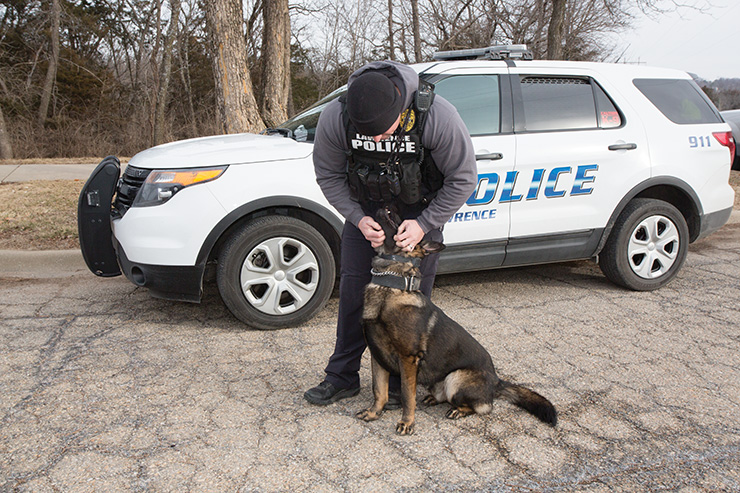
Police dog Kai and Officer Kevin Henderson
While most dogs provide their owners with invaluable companionship, the only work the average house pet does on any given day is fetch a stick or two. There are, however, some local dogs that live up to the old adage “working like a dog” by doing things like making the streets of Lawrence safer, assisting their owners with daily tasks or brightening the day of the stressed and depressed.
Kai and C.B., the Lawrence Police Department’s new patrol service dogs, may be some of the hardest working dogs in town. These German Shepherd mixes work three shifts a week helping the department find evidence and track and detain suspects.
Kai and C.B. arrived in Lawrence in early 2015 after their handlers, officers Kevin Henderson and Matt Weidl, traveled with Sgt. Casey Cooper to San Antonio, Texas, to purchase the dogs from a kennel that imports the animals from a service dog breeder in Eastern Europe. The total cost for both dogs was $19,000.
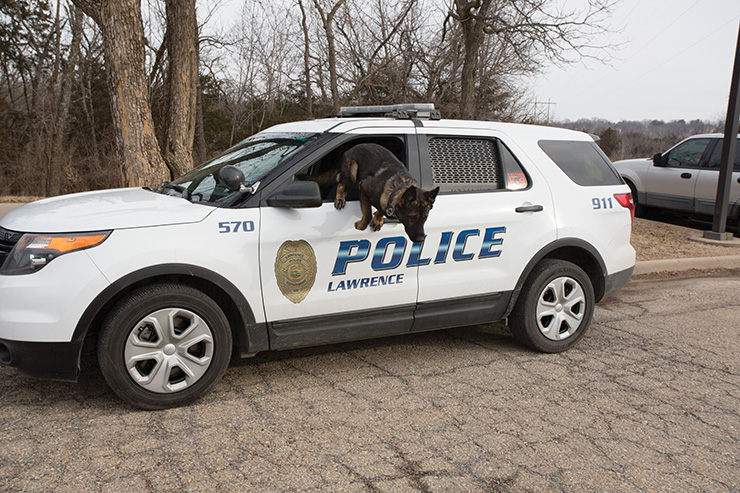
Police dog Kai
To get the dogs ready for police work, Henderson and Weidl took Kai and C.B. to an intense 10-week training given by the Kansas Highway Patrol. There, the dogs and their handlers spent 10 hours a day, five days a week learning and practicing the tools of the trade.
“It was a lot of work but a lot of fun,” says Henderson, who is Kai’s handler. “The Highway Patrol is very well-respected in the dog world, and they have some outstanding trainers. We are so lucky to have been able to go and train with them.”
Kai and C.B. are multipurpose service dogs, meaning they can detect narcotics, locate evidence and track, apprehend and detain fleeing suspects. Sgt. Casey Cooper says the use of the dogs is guided by policies and established case laws, but the proper deployment of the patrol service dog is ultimately up to the discretion of the trained handler.
“These handlers have proven their decision-making capabilities throughout their time at the police department and know the standards and expectations of the department,” he says.
During a short demonstration, Henderson, using short verbal commands, directs Kai to find a set of keys dropped in the snow. With his tail wagging and his nose to the ground, Kai soon indicates he has found the keys by lying down in front them, his tail still wagging.
When apprehending felons, Henderson explains the dogs are trained to bite the arm or whatever else is available. Their bite pressures are “extremely hard,” he says, but biting is not always necessary. Oftentimes, just the presence of the dog or the dog’s barking is enough to convince someone to surrender.
“They don’t just bite everybody,” Henderson explains. “Only a fleeing, combative type of suspect. If somebody runs, but then that person stops to surrender, our dogs are trained to stop, lie down and detain them by barking. The barking is a huge intimidation factor.”
Kai and C.B. live with their respective handlers, but given the serious nature of their duties and the intensity of their personalities, the dogs are not treated like your typical house pets.
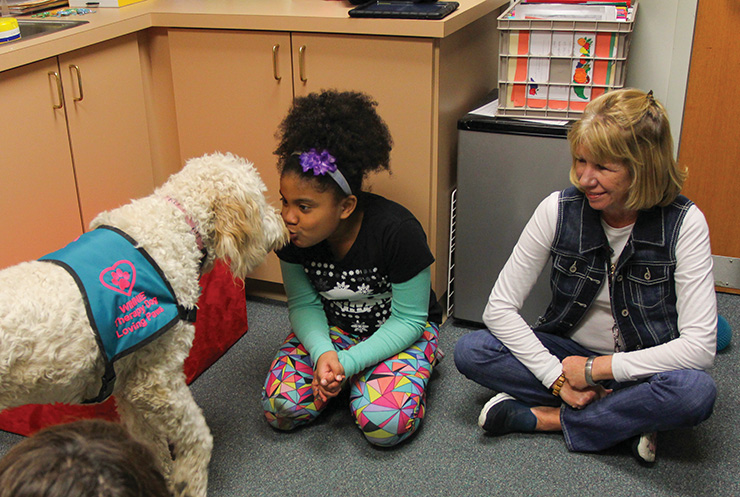
Winnie, Cierra Bostic, Robin Dillon at Sunflower
“They are bred to have the drive and the traits needed to handle police work,” Henderson says. “You have to treat them with respect and understand their capabilities.”
He says you would never see Kai lounging on the couch at home or in the kitchen begging for food. When Kai is off duty, he hangs out in a large, comfortable pen below Henderson’s raised porch. When Kai is out of his pen and running around the backyard, Henderson is always present. To maintain focus and ensure safety, officers in the department refrain from petting the service dogs when they are at the station.
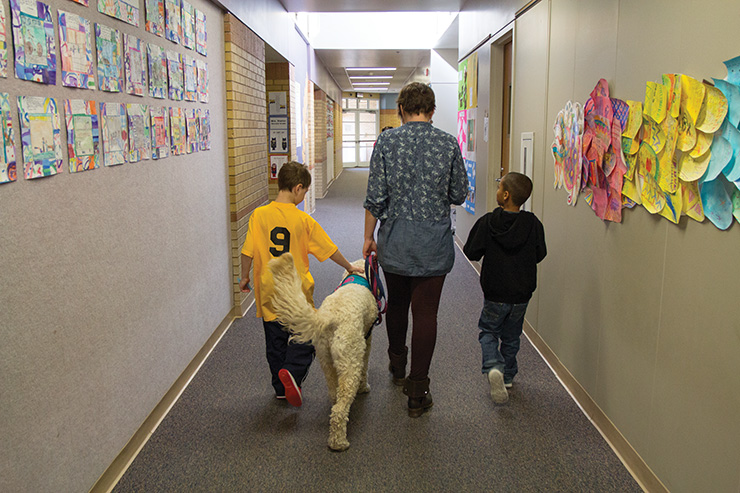
Lana Seibel, Winnie & Students at Sunflower
Henderson and Weidl currently work opposite shifts three days a week in order to maximize the time the service dogs are available. Both officers also take their dogs to a weekly maintenance training session in Topeka with the Highway Patrol.
“We probably do more training than some people think we need to do, but when we get the dogs out there and ready to go, we want them to do their job and do it correctly.” Henderson says. “These are our first dogs, and we want them to be successful.”
C.B. and Kai make the department more efficient and increase safety for the community and the officers. Henderson would like to see the department purchase two more dogs in the future to cover all of the shifts. Having a dog that is trained to detect explosives would be especially helpful given they regularly have to call in a “bomb dog” from other departments to do sweeps at large events, he says.
“Our dogs have been involved in 12 to 15 felony apprehensions so far,” Henderson says. “That’s pretty good knowing that before we may not have found those people, and they could have committed more crimes to escape. It’s a great benefit to Lawrence and the county to have them working.”
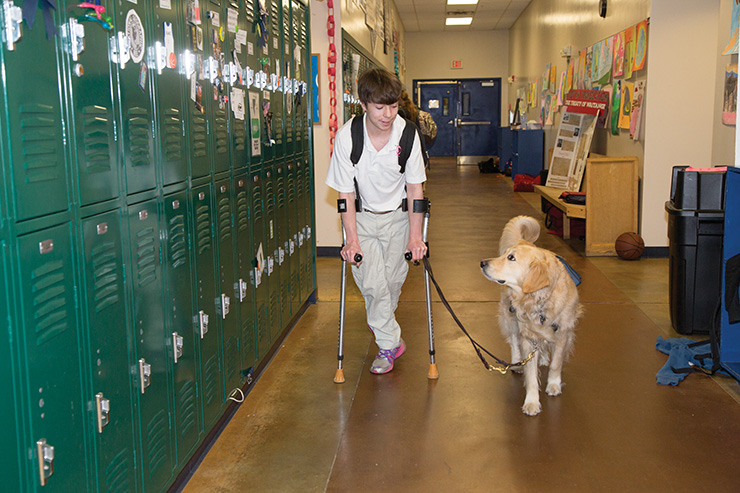
Alex White and Dondo at Bishop Seabury
Dondo, a service dog for Bishop Seabury eighth-grader Alex White, is also a highly trained canine with an important job to do. However, the life of this Golden Retriever is not quite as an intense as the Lawrence Police Department’s German Shepherd mixes.
Alex, who has hereditary spastic paraplegia, a progressive condition where the legs weaken and stiffen over time, has Dondo by his side at school and at activities such as youth group and Lawrence Children’s Choir (Dondo even gets to go on-stage with Alex when the choir performs).
Technically, people are not supposed to pet Dondo when he is wearing his work harness, but because he is often surrounded by enthusiastic teenagers, Dondo sometimes sneaks in a pat or two.
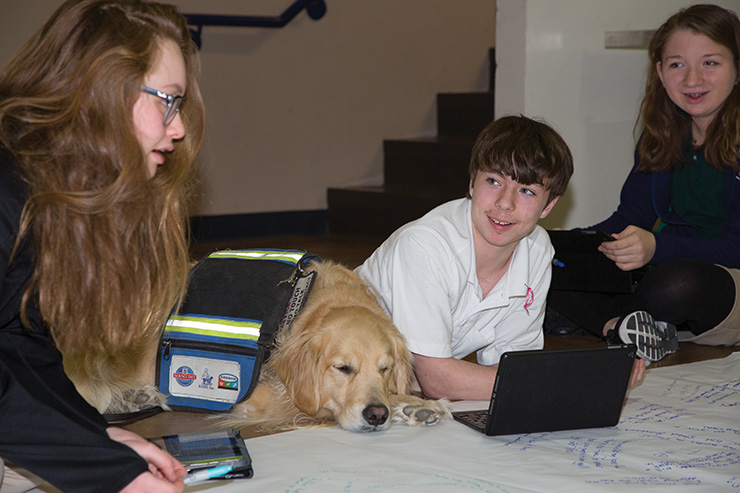
Alex White and Dondo
“If it’s anybody’s fault, it’s mine,” Alex says. “People understand they aren’t supposed to pet him, but if people ask to pet him, I will usually say yes. Sometimes it’s Dondo provoking them. If someone has pets at home, Dondo will start sniffing their legs or put his head in their lap.”
Alex uses crutches to move about now but will eventually require the use of a wheelchair. Dondo is trained to help Alex with a variety of tasks, including helping him get back on his feet if he falls; retrieving dropped or selected items; assisting in dressing and undressing; turning lights on and off; and opening and closing doors. Alex says he doesn’t currently need all of the assistance Dondo is capable of providing. However, establishing a bond with Dondo, familiarizing him with the school environment and continuing to work on training with Dondo are all done with the future in mind.
“The older I get, the more the condition will worsen,” Alex explains. “We got Dondo so that in the future, when I need him more, he will be there.”
Alex’s family got Dondo from KSDS Inc. Assistance Dogs, a nonprofit in Washington, Kansas, that breeds and trains service and guide dogs for individuals with mobility issues and visual impairments. Dogs from KSDS, which are all Golden and Labrador Retrievers, undergo a multiyear training process that begins as soon as they are weaned from their mothers.
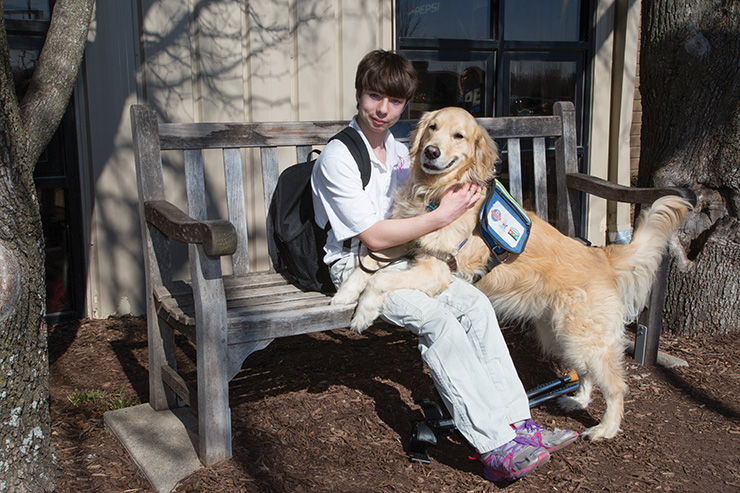
Alex White and Dondo
Puppies are placed with volunteer puppy raisers, who help the dogs develop good social skills. After about a year with a puppy raiser, KSDS dogs undergo an intermediate obedience training that lasts about 18 months. Female inmates at the Topeka Correctional Facility perform this intermediate training through a program called Pooches and Pals. Once the dogs have completed these first two steps, KSDS carries out the advanced training with the dogs following strict standards set by Assistance Dogs International. Once KSDS matched Dondo with Alex, the pair spent two weeks at the KSDS facility learning to work together.
Unlike police service dogs, when Dondo is at home or out of his harness, he gets to be a regular pet, a transition Alex says Dondo makes seamlessly. When the harness is on, Dondo has to work; but when the harness if off, Dondo will roll in the mud, get into the trash and make silly bids for attention in competition with the family’s other dog, a Scottish Terrier.
On the rare occasion when Alex and Dondo are not together, Dondo looks for Alex and often paces until he returns. Alex, on the other hand, is OK with an occasional break.
“Sometimes I am upset when we’re not together, but sometimes I’m not because it’s nice to have a little freedom,” Alex says. “The trainers tell us it’s kind of like being a married couple. There are times when one person needs some time apart, even though the other may want to be right at their side.”
While Kai, C.B. and Dondo are dogs that basically have full-time jobs, the dogs that serve through the local nonprofit Loving Paws Animal Therapy are part-timers.
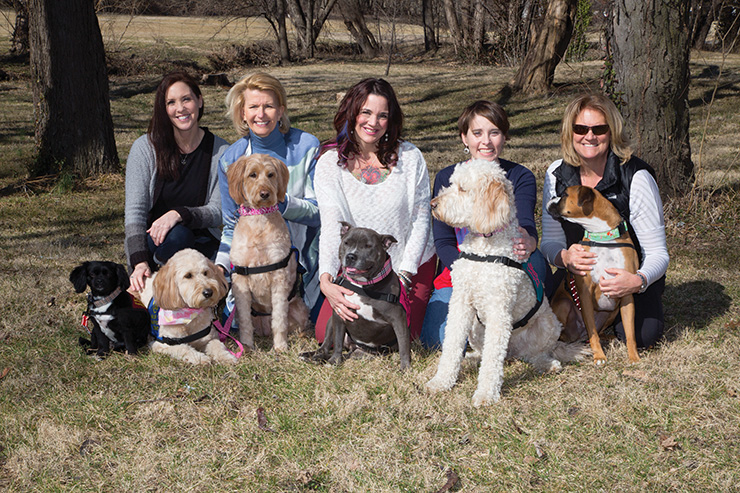
L to R: Laura Teenor-Sutliffe with Bella, Betty Click with Sadie and Riley, Raven Rajani with Shakti (founding dog of the program), Lana Seibel with Winnie, Lea VanderVelde with Layla
Loving Paws is an animal-assisted activity program that certifies dogs and their owners to volunteer together in a therapeutic capacity in a variety of community settings. The organization currently has more than 50 certified teams that regularly visit schools, libraries, after-school programs, assisted-living communities, the juvenile detention center and more.
“We know for a fact that interactions with animals are healing,” Loving Paws founder Raven Rajani says. “They support happy hormones in our brains. And support good health both physically and emotionally. Our teams provide a social-tactile exchange, and the goal is to make people happy and to reduce their stress.”
One of the most popular sites for Loving Paws volunteers is the University of Kansas, where teams visit student housing and libraries to interact with the students for “stress-busting” sessions.
“College students report that the primary impediments to success in their learning are stress, anxiety and depression, and that’s really what our target is, “ Rajani explains. “The students go absolutely mad for the dogs. It’s a blast.”
Rajani, a social worker and self-described “crazy dog person,” was inspired to start Loving Paws in Lawrence after completing a therapy-dog-training program in Kansas City with her Blue Staffordshire Terrier, Shakti. While volunteering at sites around Kansas City, she realized there was a need for a similar organization in Lawrence.
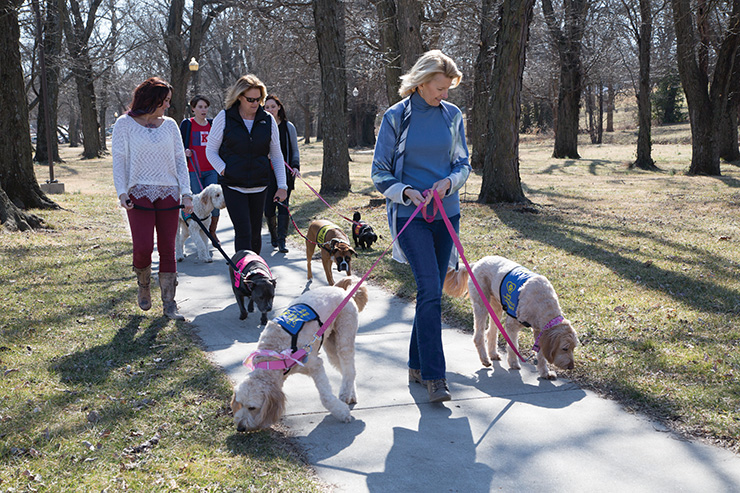
Loving Paws
“As I was driving back and forth every week, I thought: ‘Why am I doing this for the Kansas City community when we don’t have anything for our own community?’ ” she says.
After doing extensive research on the best practices for training and utilizing therapy dogs, and also teaching herself how to start a nonprofit, Rajani launched Loving Paws in 2013.
“When I started this program, I knew I wanted dogs to be reciprocal participants,” Rajani says. “I’ve seen some programs where the dogs are not having fun, so from my perspective, I felt an ethical obligation not only as a social worker but also an advocate for animals to make sure that the animals that come through our program want to be social.”
Rajani says Loving Paws looks for dogs that are not only highly trained by owners but also enjoy interacting and engaging with people. The Loving Paws certification process involves a three-hour orientation for the handlers that includes diversity and sensitivity training, and ends in a written test. The dogs must also pass an evaluation that ensures the dog can navigate a variety of situations safely and courteously.
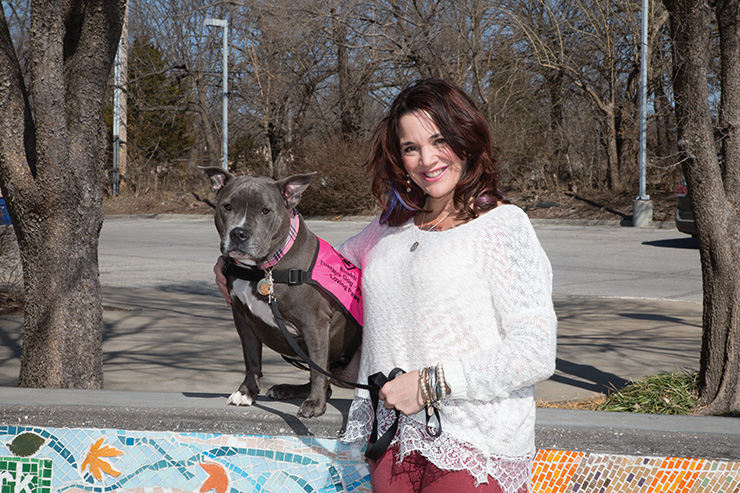
Loving Paws – Raven Rajani with Shakti
Once a handler/dog team successfully passes the volunteer team evaluation, the handler goes on a shadow visit without the dog to observe another team in action. To fulfill the certification, the team in training completes a visit under the supervision of a mentor to ensure they are ready to volunteer on their own.
“The thing I like about this program is that it is a win-win for everybody,” Rajani says. “The people who come through the program dig their dogs, and they think their dogs are special—and they are. And the humans are special for wanting to give their time and share their pets.”

5 Comments
I really liked your blog post.Much thanks again. Awesome.
Good blog post. I definitely love this website.
Keep it up!
I know this if off topic but I’m looking into starting
my own weblog and was curious what all is needed to get set up?
I’m assuming having a blog like yours would cost a pretty penny?
I’m not very internet smart so I’m not 100% certain. Any recommendations or advice would be
greatly appreciated. Thank you
When someone writes an article he/she keeps the image of a user in his/her mind
that how a user can be aware of it. So that’s why this piece of writing is perfect.
Thanks!
Hi there to all, how is everything, I think every one is getting more from this web site, and your views are fastidious designed for new people.